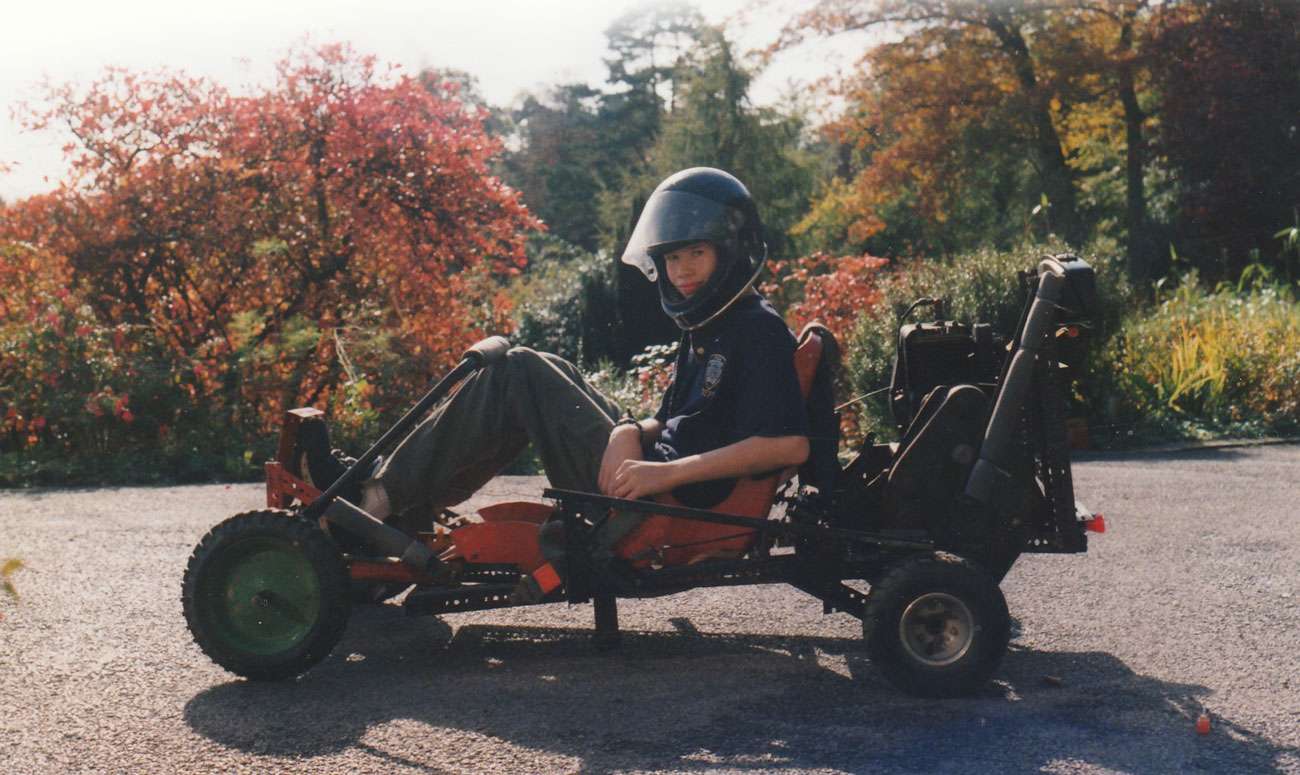
Me in my first hand made ‘go kart’ made out of an old Suffolk Punch lawnmower engine stuck on the back. It had no brakes! I was 8 years old when I started to build it
I was born in Guildford and grew up in Ewhurst where my parents had a house on Pitch Hill. My first school was Ewhurst Primary then I went to Cranleigh Prep School, followed by Cranleigh Senior School and from there to Brooklands College. I have one brother and sister and I’m the youngest in the family.My brothers the oldest, aged 42 now and my sisters recently had her 40thbirthday. I am 33 years of age.
My father has been a drummer for many years and has been in various bands throughout his career. My brother has followed my dad’s footsteps into the music industry, and now runs his own music agency, sorting bookings and events for artists. My sister lives in Majorca and has a private chef business, which she runs with her husband. I had no inclination to be involved in any of those things. I play drums very badly and I’m more likely to fix a drum kit than play it!
From about the age of 10 years, I was always ‘fixing things’ at home, as opposed to my dad who didn’t even know how to take a spark plug out of the lawnmower, and I would fix things like that for him too. As we lived up in the Surrey hills, I spent a lot of time adventuring in the woodland, climbing and playing in our treehouse. I enjoyed time at the Sayers Croft centre in Ewhurst, doing high rope courses and learning to climb there.
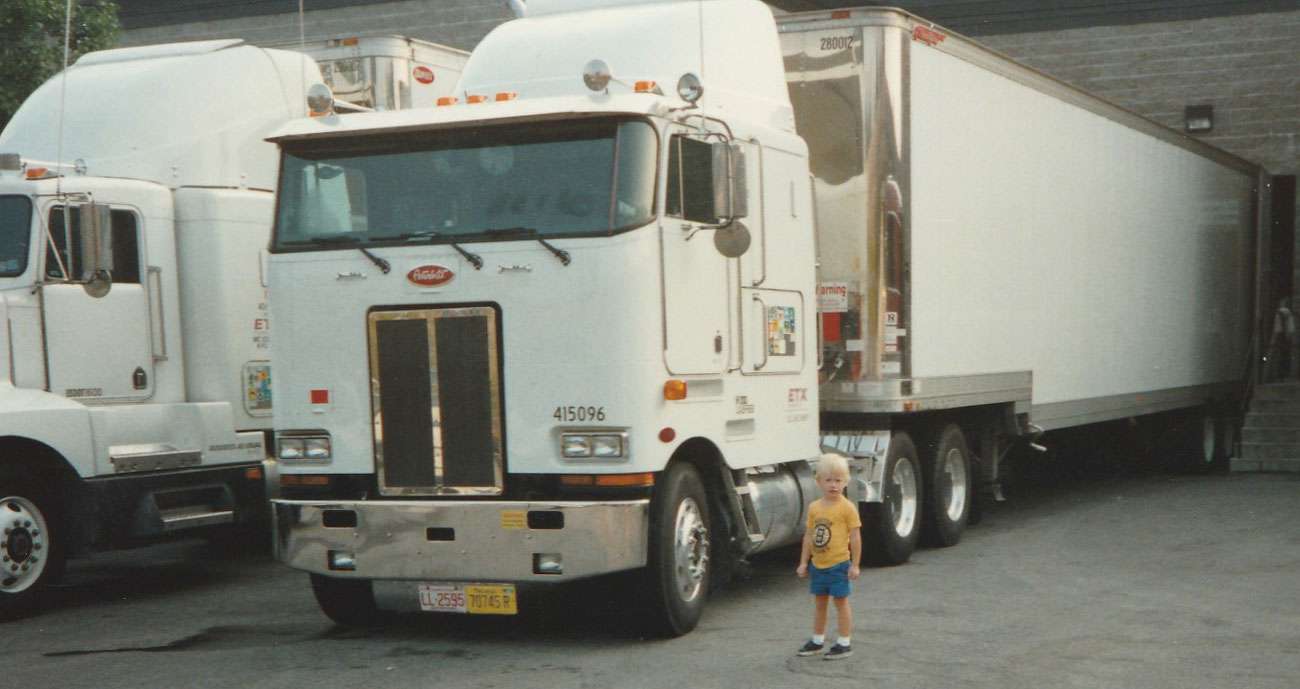
Me at about 4 years old, I was drawn to vehicles
My granddad was an engineer. He came over to Britain during the war, from Poland and worked at Vicars Armstrong in Brooklands to aid the British efforts. He was an aircraft engineer, and a pilot too. He left Poland in a plane he piloted and helped get other people out as the Nazi regime entered. He passed away when I was quite young, so I didn’t get much time to spend with him, but he is probably where I get my engineering streak from as no one else I can think of in the family, does this sort of stuff.
When I was at Cranleigh Prep school, there was an ‘art class’ that was really an early form of design technology and we used to build things like go karts. I was never particularly academic, certainly Maths, English and French weren’t my forte, I was fairly good at science, especially anything electrical. I think I built about four go karts when I was there, none of which ever worked!
I boarded at Cranleigh Prep school, even though my parents only lived in Ewhurst. It took me about 3 or 4 years to realise Ewhurst wasn’t that far away, because when my parents would take me back after a weekend on a Sunday night, the long way round and I thought that Cranleigh school was quite a long distance from my house. They had one prime directive . . . to stop me running home! I had been a pretty naughty kid at Cranleigh Prep. But one Sunday night returning to the school, my dad drove me back and completely forgot their scheme and drove the normal route, and we arrived within about 6 minutes. I was very suspicious about the whole situation after that.
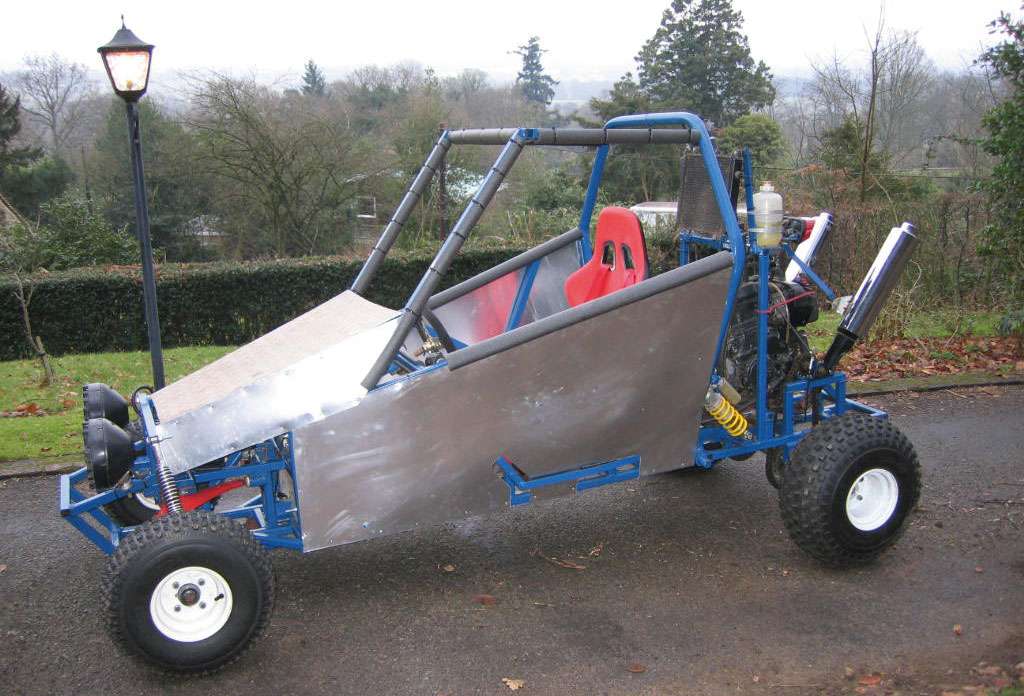
Another ‘go kart’ designed as a project
As I said before, I was very naughty at Cranleigh Prep, I spent a lot of time being disciplined and my ‘get out of jail card’ would be to build things, so I spent a lot of time in the art room in the lab there. It was when I went up to the Senior school, that I nurtured my engineering interest further and from there I took my GCSE in Design Technology. For my design project I built a go-ped, a petrol scooter and that was really enjoyable. The other thing I was keen on at school was the Combined Cadet Force and I was able to spend a lot of time involved in this. We would go on great trips to Wales, with the CCF staff Sergeant, who had previously served in the military. It was while I was at Cranleigh School I realised I wanted to join the army as a vehicle technician, and so combine two passions effectively. I really enjoyed engineering and the outdoor life. I was country grown so I was used to shooting, and that sort of thing.
Moving forward, I left Cranleigh before Sixth Form because at that time the school didn’t offer Design Technology at A level. I went to Brooklands College in Weybridge, where I did a National Diploma in engineering. Many students who go to Brooklands to study engineering, go into the motorsport side of it, which is specific to vehicles. I wasn’t sure at that point, what direction I wanted to take in the army, whether to go into the Royal Engineers, The Royal Electrical Mechanical Engineers, or the Royal Signals. I kept my choices open by going for an Engineering Diploma as opposed to a Vehicle Diploma. I had two really great years there and passed with flying colours.
From when I left Brooklands to going into the Army was a very short time frame. I went straight onto basic training the following week at the Pirbright training college. There you learn in three months how to be a soldier, and that was brilliant. I was about 18, nearly 19 then. I’d learnt to drive while at college and spent 3 days a week as a labourer, working hard on a building site. I used that time to get fit to try and beat the basic training and pass selection. During my basic training I was selected to go on the Artificer course which came out quite early on in my training. Originally when I left Cranleigh school and was at Brooklands, I was given an induction course at Sandhurst as a commissioned officer. I could have gone down the Officer route if I wanted to, but I would have needed to go to university first, and I didn’t really fancy that, it wasn’t right for me. I wanted to be hands-on and more involved in engineering.
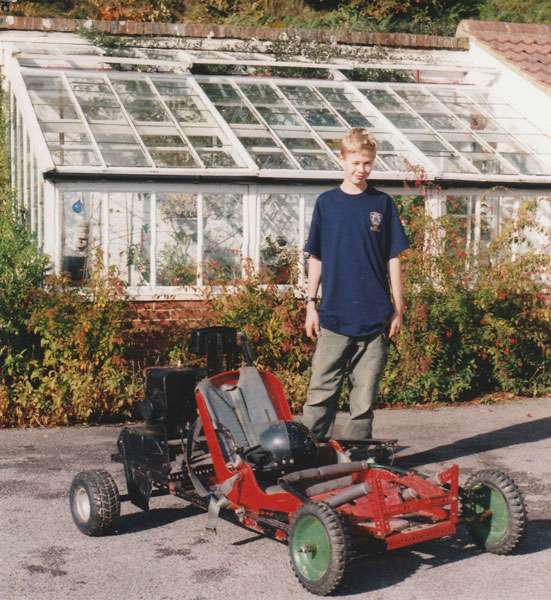
I was never very far away from anything mechanical
The Artificer route was offered as a fast-track non-commissioner route, which meant fast tracking ranks, and gaining extra training specific to your field. When I left Brooklands College, I went to Pirbright, to learn how to be a solider and all that kind of stuff. Fifty-four of us joined that platoon. From that point I was placed in 4Bn REME, down in Borden and went into the School of Electrical and Mechanical Engineers.
I studied the electrical and mechanical engineering trade, as a tracked vehicle engineer VM(A), heavy artillery, tanks, armoured personnel carriers, that type of thing. My main weapon system which I was working on at the time was the challenger 2 main battle tank, and we’d do a lot of classroom time and physical training on that, it was some of the best times of my life.
This was just at the peak of the Afghanistan conflict, and what we were due to do was Phase 1, which was basic training, Phase 2 which is learning your trade and Phase 3 which is learning as on-the-job shadowing. However, two thirds of the way into my training, I started dropping my fitness levels. You are regularly marked on where your fitness is and have basic fitness tests about once a fortnight.
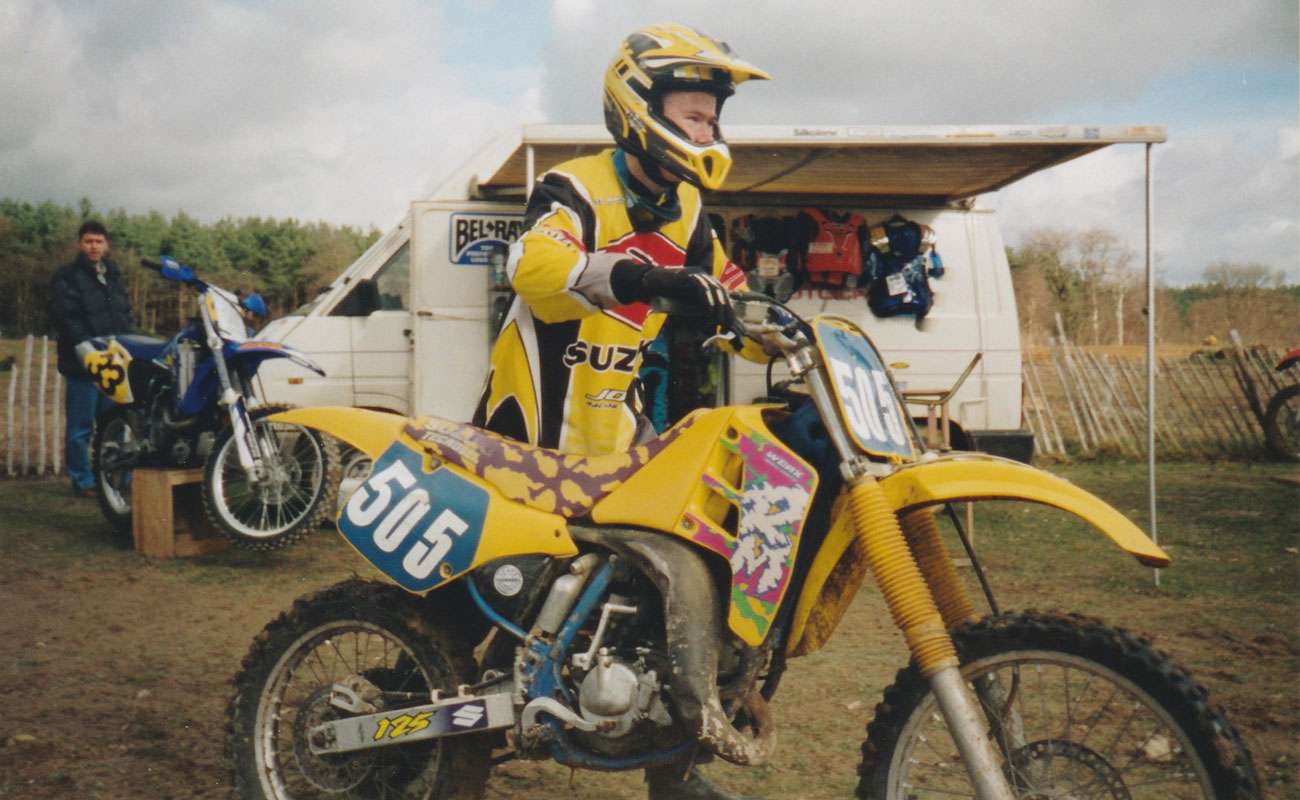
Speed and driving was in my blood
It’s quite an intense experience. I didn’t struggle with it because I’m tall and could stay at the front easily, but I know some of the shorter guys struggled. During my phase 2 training, after about 9 months training, my run times started to drop off. I’d gone from the top 15% of my troop to the bottom 30% which was concerning because they graph your data and productivity. Initially they advised me to drink less beer in the mid-week and keep hammering it. I personally couldn’t get my run times back up, I felt exhausted more and more of the time. There was a particular day where I remember having a dental abscess that was really bad and it stuck with me for 2-3 weeks. I remember going to the medics to report a very sore tooth. They were great and in their defence, they didn’t know exactly what they were looking for and gave me antibiotics and sent me on my way. Three weeks later I had a chest infection and was given more antibiotics and told it would go away.
Strangely enough it was someone in my squad who suggested I ask for a blood test. I went ahead and did just that. When the results came through the medics said I needed further tests immediately. I was very quickly moved into Frimley Park, which was a military hospital then. At the time my parents were unaware of all that was going on because I kept it quiet. Further tests involved taking a sample of my bone marrow from my hips. My Commanding Officer visited a few times and was very helpful, but ultimately even after being in hospital for 2-3 days, still no one knew what was causing my symptoms.
Subsequently I had an operation and as I was being put to sleep, I told the Nurse (Stella), I didn’t want an anaesthetic until I knew what the operation was for. She said there was a small chance it could be cancer and the operation was needed for further investigations to be carried out. She was reassuring but was also clear at how serious this was. I was crying my eyes out as I went to sleep. It was a very low point for me, I felt like I wouldn’t wake up. It was a very difficult experience not knowing what was going on. I’d never been ill to that extent before, I’d always been in top notch health.
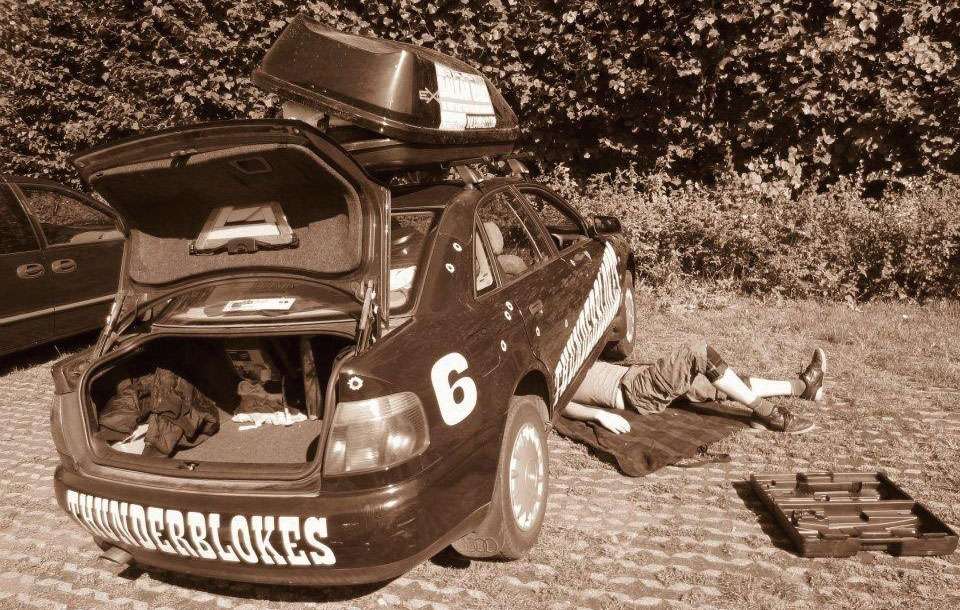
A bit of necessary roadside maintenance and tinkering during a car rally
When I came around from the anaesthetic, they explained I had Leukaemia, at quite an advanced stage. They said my blood counts were very low and I required urgent treatment.
At this point I didn’t know whether to tell my parents or not as they still didn’t know I was even in hospital. In a day I would be moved again to the Royal Marsden because Frimley Park didn’t specialise in the treatment I required so I felt I had no option but to let my parents know. Without a doubt the team at the Royal Marsden saved my life.
The care I received was second to none. It’s not a private hospital, it’s all NHS. They gave me a whole bank of tests and said I should have gone in a few months before. I’d persevered through because I was doing my training but all the infections were caused by my immunity being so low. I was given a 10-15% chance of survival at the point of entry but the good thing was I was in the right place and apparently the muscle fitness I’d built up over time could be what would save me.
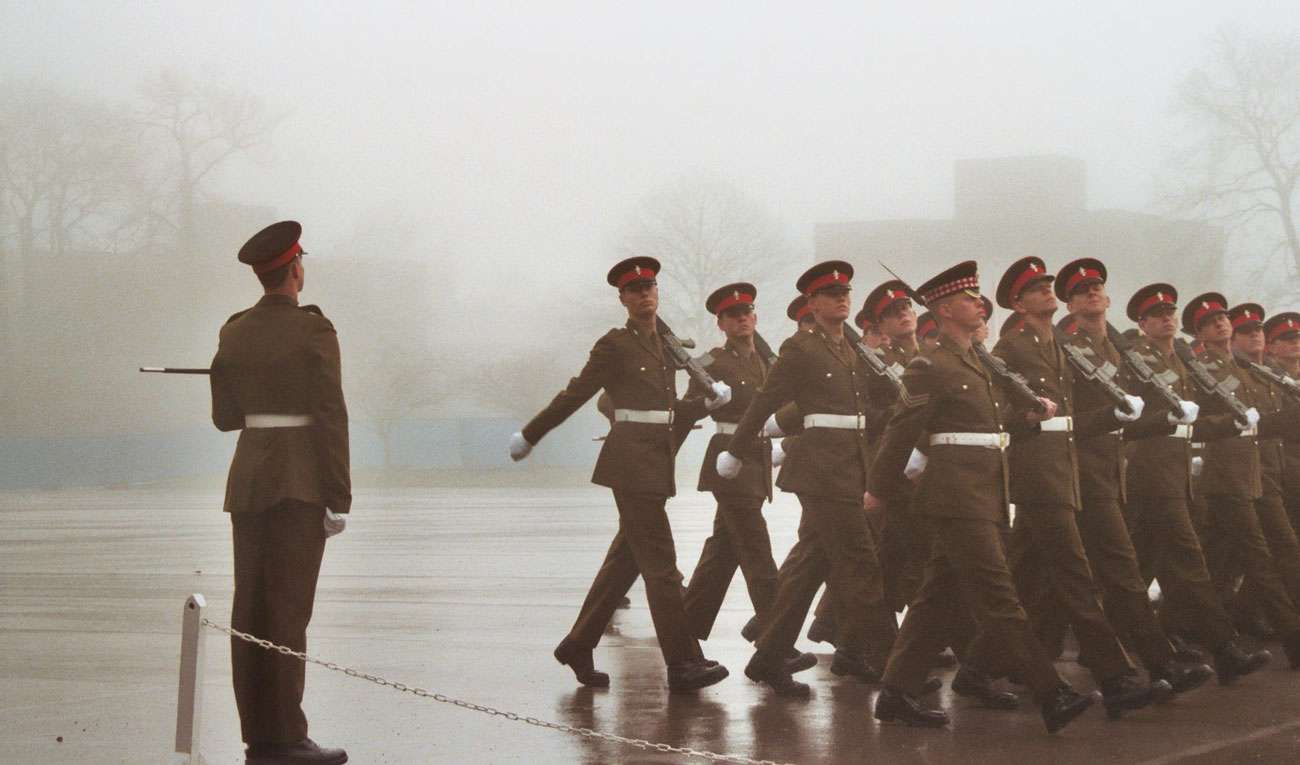
Passing out Parade, (me in the back row). Little did I know I’d soon be passing out in a completely different way
It was a very fortunate turn of events that happened in a short amount of time really. If I hadn’t joined the army I may not have survived, but I was treated quickly. I was in a room all on my own – they couldn’t put anyone else in the room because of infection control. I was alone in this room for about 13 weeks. In about 2-3 weeks my chance of survival had increased to 50-60%. My treatment was all chemotherapy, started off immediately intravenously. They put a PICC line in my arm and a central line in my chest, so the drugs could be given directly, and immediately if needed. I had a lot of blood transfers, changing my blood completely three or four times in the first week. I had about 6-8 pints put through me, and that picked me up and I got through it.
I completed the 13 weeks of treatment with the support of my family and friends. I had the army lads come to see me, the Army Chaplin came at one point and gave me the blessing which was a bit scary. But there were worse things being said to me every day than the blessing -‘This is the treatment you’re going to start’. ‘Here’s what your chances are’. ‘This is how it’s going to affect you’. ‘You will lose your hair’. ‘You will have issues with your stomach’. ‘You won’t want to eat anything. Then you’ll want to eat everything. ‘You’ll put on and lose weight’. All that sort of stuff, it was quite hard. I got through that whole ordeal and when they classed me as an outpatient, I was moved into a different ward. The blood transfers and chemo purified my system and the chemo tried to stop the leukaemia coming back.
I was healthy enough to be transferred to an outpatient and came back five days a week for chemo, so I was commuting up and down to the hospital. My parents gave me lifts and I could just about drive a little at the time. I could walk, but was very weak. I spent a lot of time resting and hanging around, trying to make the most of it. The silver lining was that my mind was active and I kept focused on what might happen in the future.
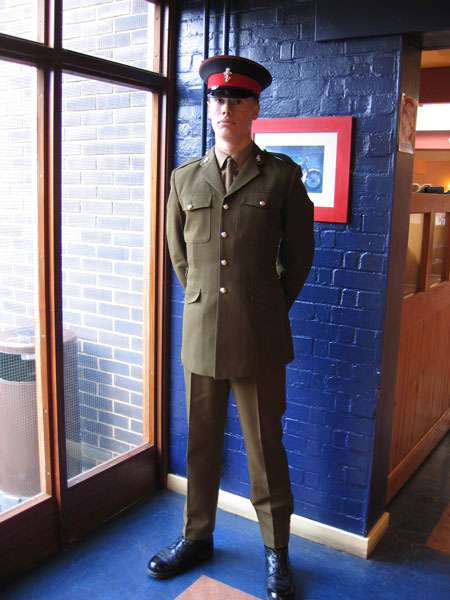
Fighting fit-so I thought
At the next stage I was selected for a special trial treatment course for patients of my age called UK ALL (Acute Lymphoblastic Leukaemia). Being 19 I was right between Paediatric and Adult care. So I tried this course, which was set in stone. I had treatment five days a week for the first 12 weeks, then I had three days a week for another 12 weeks, then two days and eventually just one day a week, or thereabouts.
When I got down to two days a week, I was not particularly unhealthy, I was in pretty good shape so I thought I would just continue with my daily operations and go back to the army. I returned to 4Bn to continue my training, clocked in with my military ID and went back to work. I went back 3 days a week and was at home 2 days a week. With all the toing and froing to hospital for this chemo course, I didn’t want to get behind on my training. One thing they distil in you in the army is that you don’t want to get ‘back trooped’, because once you go back you lose all your mates and teamwork, and go back a whole year. I didn’t want that to happen so I returned and kept training hard.
One day on parade at 5am, instead of there being say, 600 people there, there was 601. They realised that I had been serving class and everything but was unaccounted for all this time. They pulled me aside to tell me I couldn’t serve in the army and receive chemotherapy at the same time and eventually gave me a medical discharge. The timing of my discharge was helpful in that throughout my illness and treatment I was paid in full. As a training salary it was pretty low for the first 12 months but I had put it all in savings and with that I started planning what I was going to do with my time from here on.

My first Land Rover
I had a Land Rover which I’d built from the ground up as I knew Land Rovers so well, and I converted it into a mobile workshop. I then revisited what I knew so well and began agricultural and garden machinery repairs, for local friends of the family. I would do callouts to people’s houses from the back of my Land Rover, fixing their equipment, anything from diggers to lawnmowers. I did this for about four months and then gradually people were asking if I could repair their cars. One winter I was under a car with the trickle of rain water going down my neck as I lay in the gutter, and I thought, ‘Sod this, I need to be indoors’.
I can be very ‘OCD’ about getting things right and I believed I could do a far higher quality job indoors than outdoors, especially with bigger work, so I moved into a small workshop which I built myself. I converted an old barn in a friend’s place in Shamley Green and officially began my business called M.E.S. I was a one-man band for about a year, I made the whole thing from the ground up. I had just about got myself going properly, when unfortunately, the house was sold and I had to move at short notice. This was another case of character-building. To keep getting pushed backwards and forwards can be demoralising. I had 48 hours’ notice to pack up, no contract or lease, and had to look for a new site. I knew roughly where I wanted to be and spoke to a few people with different sites available and we ended up where we are now in Cranleigh, we were very small. It was me by myself with one ramp at the outset and slowly but methodically it grew into what we are today.
We have been in Cranleigh for over 11 years now and worked hard to promote and build a business based on trust and experience. One thing I didn’t realise when you start in the motor trade is the unevenness. You think you can simply do a good job and move forward a step, and if you do a bad job, you go back a step. But in the motor trade, because the industry has been tarnished with a poor reputation for many years in the past, you have to work against that. However, after working well for 5 years, we got to a good place, though it was hard. We have customers now whose lawnmowers I serviced years ago. We still have them 13 years later and people come back and back.
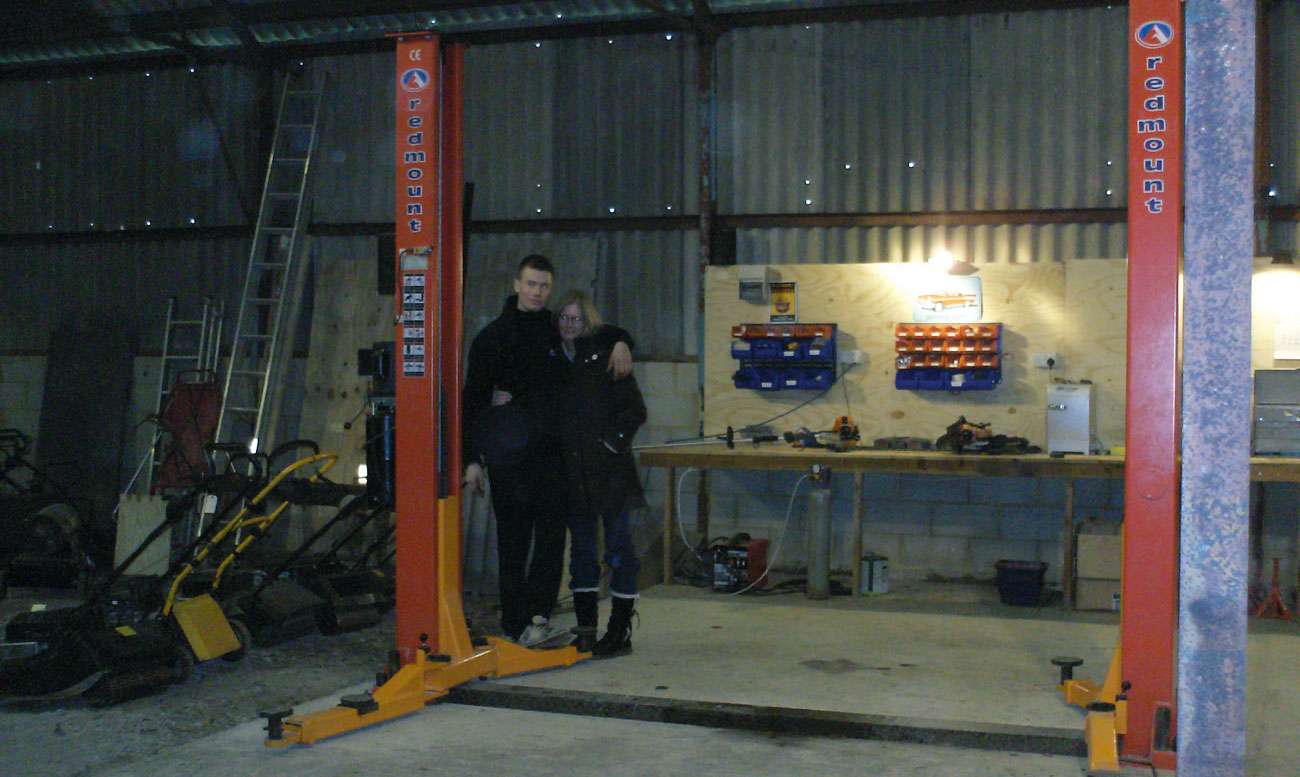
My first proper workshop
We’ve built the business from just me as the one-man band. I would work all day and invoice in the evening to catch up. I worked like this 7-days a week. We’ve built the business up to 15 staff in our Cranleigh branch.
There were two factors when I left the army that motivated me to start my own business.
One of the long-term effects I was warned about was the side effects of the high dose steroid pills I’d received to treat the leukaemia in the deep down bone joints. Leukaemia is a bugger for hiding away, so even after treatment it can survive and come back twice as strong.

I was given high doses of dexamethasone steroids and a side effect of this is that the joints can deteriorate from attacking the leukaemia. The good news is the steroids were effective in killing the leukaemia and got it all after a year’s worth of treatment and it was reduced right down to a slower treatment and my results started coming back nice and healthy which is great. The downside of it is it killed my knee joints. It can often affect the hips, knees and ankles. In my case it’s only my knees so far. But I had to have one new total prosthetic knee fitted last year in 2018, and I’m due to have another one changed next year. One of the side effects of having new knees is if you work too hard on them by going underneath vehicles for example, they reach a point where a further knee replacement isn’t eventually possible. Effectively I was told I should plan to be desk bound or wheelchair bound by 35-40+, which was a real slam for me. I reached the point where I decided if I’m going to do this, I’ll do it properly. I decided to push hard, and get my business to a position where if I couldn’t work under a vehicle, I’d be in a position of desk likeness, more customer-based. In order for that to work I needed to build up a team and a support network that would make that happen.
The other reason I opened M.E.S was because my treatment fell on random days and it’s too difficult to work somewhere else, other employers won’t necessarily take you on, knowing you have a serious illness that needs on-going treatment.
I’d also been told because of the amount of treatment I’d had and how ill I’d been, I would be significantly less likely to have kids later in life. When you are 18-19 that can’t be any further from your mind, you’re just getting on with life. If I survive that’s great but if I can’t have kids that’s an unfortunate side to it. There are a lot of things to come to terms with.
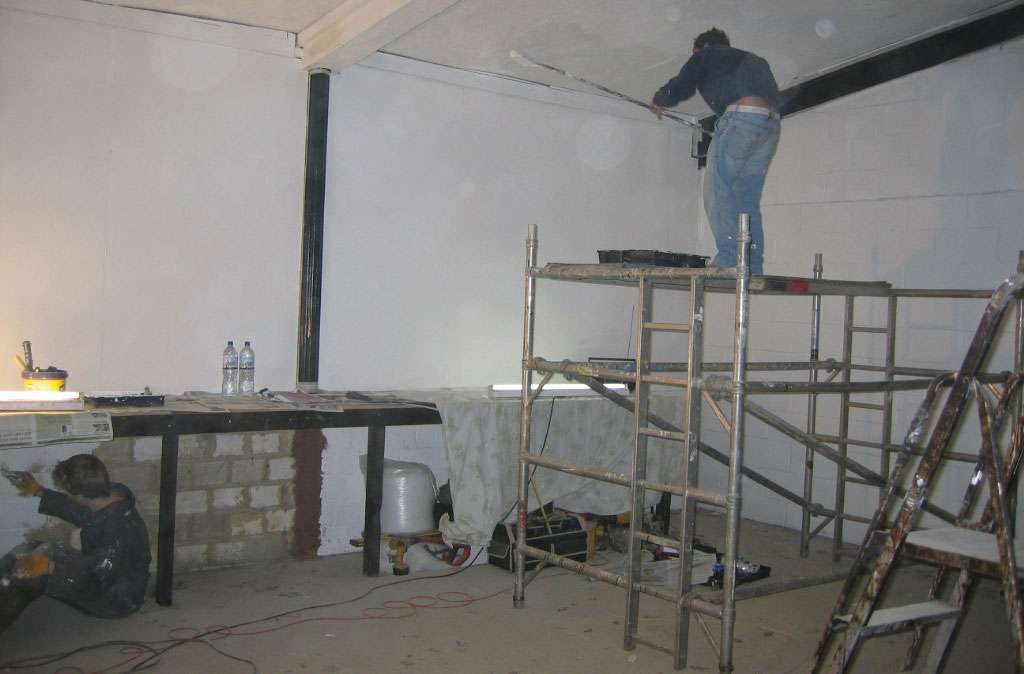
Getting the Cranleigh workshop ready
However, it was with great delight when I was 26, and I’d met my wife Ellie, we were blessed with our boy William, who will be 7 years old in February. The doctors were amazed that we had him, and he’s completely fine and healthy. We are very lucky and grateful every day. We’ve recently had our second baby, Ben, who is now 3 months old, so we’re twice as lucky! You can’t really put the blessing into words. When you’ve been told you’re not going to have children and then you do – twice!
There is the concern in the future of whether either of them would be ill at 18? Could they get the same thing? But we are reassured by doctors that it’s not genetic, so it shouldn’t be passed down. There’s no history of Leukaemia in my family before me so as far as that goes it should be fine. My family is the biggest part of my life.
So looking back my drive to create a successful business could be put down purely to the illness, almost 100%. I was driven at school, but I was average, I did things differently, I was naughty. I liked engineering but would play havoc at school. I’d build tree houses and climb trees. That’s always been in my blood, but my drive to succeed has only come in the moment when Stella, my nurse at the first operation said ‘this is quite serious’. I realised then my chances we’re 10-15% chance of survival and thought ‘Right, this is your second chance, don’t waste it’. Without that I never would have pushed as hard as I have now.
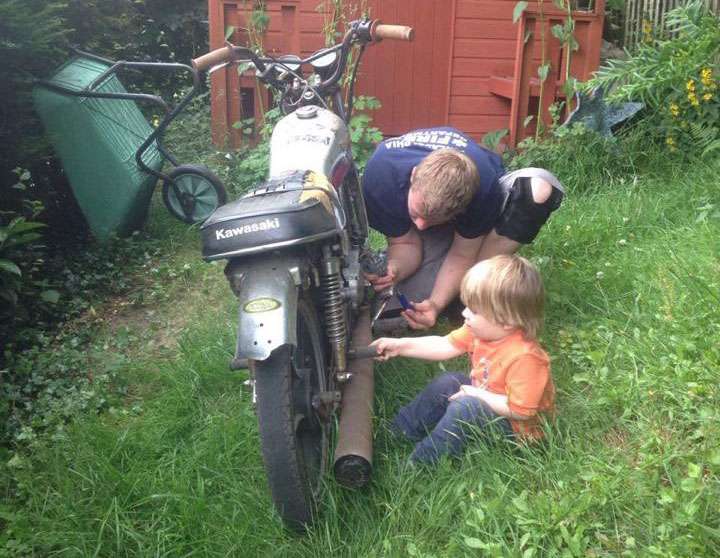
My little boy William wants to be just like his Dad
Every day is an extra day for me. I have the usual trauma of running a business and the general stress that goes with it. But in terms of my past I can put it into perspective. I can always step back, no matter how difficult it gets running the business, and remember things could have gone very differently. Had I not had the blood test in the army, had I not been treated so quickly, had I not been treated at the Royal Marsden, I would have had a very different story.
Every day is not to be wasted. It’s really given me a new perspective on life. It’s something that wasn’t by choice, but forced upon me and when you realise that you’ve got to roll with the punches, so much of the battle of illness is a mental one. I’m a true believer of what doesn’t kill you, makes you stronger. So if you decide you’re going to beat something, and do so, you then start to get the cogs moving and that drive is unparalleled.
William has just started school, he’s in year 2.You can’t keep him on the floor, he’s always in trees and all over the place. He’s very interested in cars, if he comes to work with me he wants to wash a car and see all the inner workings, he wants to know everything, and I expect Ben will be exactly the same, like father like son. It goes without saying that I couldn’t have done this without Ellie, certainly in the last 9 years we’ve been together and her support. She gave up a really great career at Park Mead as a teacher to work at the business and has given her courage, hard work and support.
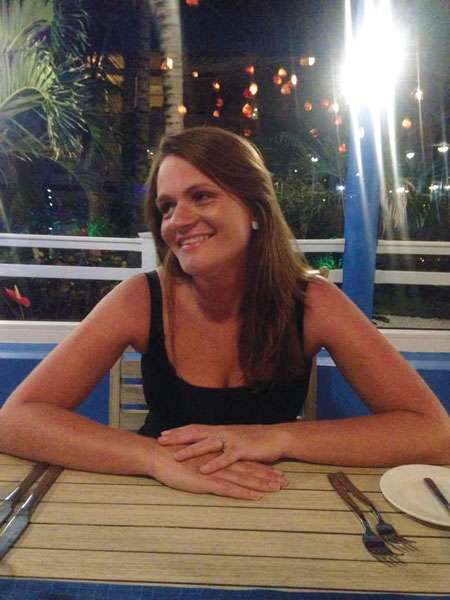
My supporting wife Ellie
My sister ended up working for 4 or 5 years at Macmillan. One of the things that made her join was the fact that I was being treated at the time. She became head of accounts corporate fundraising, and did many of the schemes with Tesco’s. So when you see their boxes, it’s my sister that organised a lot of that stuff. She was determined to give back because of the help that I received from people just like MacMillan. They are very supportive when illness strikes.
There are a lot of things to take away from this: if you’re ill, you’re not on your own, there’s a huge network of people to support you. If you are fortunate enough to have an experience like mine and survive, use that to your advantage, it can be a blessing in disguise. At the time it feels terrible, but moving forward it makes you a strong character and human being, certainly very strong willed. It gives you a whole new vision!
For more information contact Jack Bruford here:

‘Go for it!’











